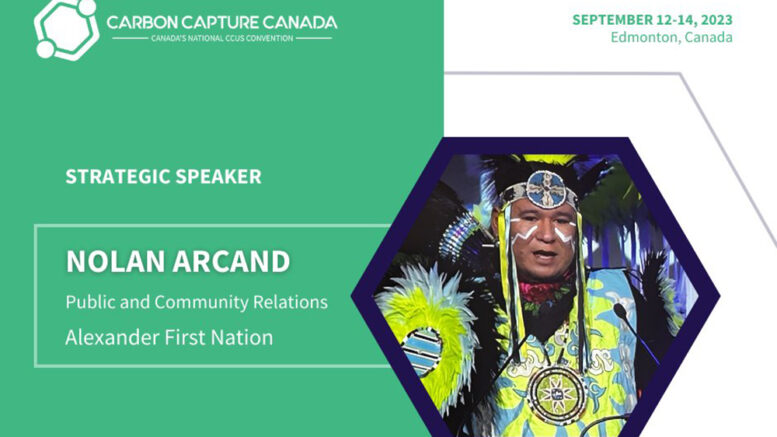By Jeremy Appel, Local Journalism Initiative Reporter
(ANNews) – The Carbon Capture Canada conference was held on Sept. 12 and 13 at the Edmonton Convention Centre, with several Indigenous speakers participating, some of whom were critical of the industry’s lack of genuine engagement with Indigenous concerns.
The conference centred around securing government and industry support for carbon capture, utilization and storage (CCUS) technology, which can be retrofitted to high-carbon dioxide emitting facilities, such as factories, power plants and refineries, to siphon away the carbon before it’s released into the air.
The event opened with an address from Nolan Arcand of Alexander First Nation, who urged participants to go beyond land acknowledgements and other tokenized gestures to take meaningful action on reconciliation.
He questioned how “feel-good” land acknowledgements benefit Indigenous people materially, noting how attendees have pitchers of clean drinking water at their tables when many Indigenous communities must depend on bottled water.
“We appreciate your acknowledgement of our ancestral lands so our people must thrive, live and follow our traditional ways of life. However, it’s essential to remember that we’re not relics of the past, but rather a firm and proud Indian people with rich cultural heritage today,” said Arcand.
He added that while it’s fashionable for companies to post about their commitment to reconciliation on LinkedIn or observe Orange Shirt Day, meaningful reconciliation goes far deeper than that.
“True reconciliation is not merely a fashionable statement,” Arcand said. “It requires a meaningful action, forging enduring relationships and partnerships, not only for the benefit of the current generation but also extending seven generations into the future.”
A major CCUS project is being proposed by the Pathways Alliance of six major fossil fuel companies, which it says will capture emissions from more than 20 oil sands facilities and transport them through a 400-km pipeline to an underground storage hub near Cold Lake.
The alliance argues this project is crucial for its plan to reach net zero by 2050.
Cold Lake First Nation Chief Kelsey Jacko, who spoke with energy executives on a Sept. 12 panel at the conference, however, told CBC News that the alliance is “ramming [the project] down our throat.”
Cold Lake has seen tailings pond leaks and a diminishing caribou population as a result of extractive industry. Jacko said he’s concerned that similar issues will arise with the Pathways initiative, given the long-term risks of injecting sequestered carbon underground.
“It’s frustrating because that’s a 400-kilometre line, and [leakage] could happen [along] the pipeline or it could happen right at the storage [area],” he told the CBC from the conference sidelines.
Jacinta Janvier, a Cold Lake First Nation councillor, echoed this concern.
“I want my children and my grandchildren and their children to have a beautiful place to live, a safe place to live,” she said. “I think people need to really think about what can happen and the consequences.”
Jacko added that he’d also like there to be a more equitable distribution of revenue from the project, because in the past Cold Lake has received a pittance compared to the profits fossil fuel companies made off their resources.
In addition to the main event in the conference hall, there were a series of smaller talks in the exhibition hall.
Kim Baker, Enbridge’s community and Indigenous engagement advisor, spoke at a session on obtaining community support for CCUS projects alongside Breanne O’Reilly and Greg Maidment of Carbon Management Canada.
“When it comes to support for projects, public opinion really matters,” Baker, who is a member of Red Pheasant Cree Nation in Saskatchewan, said.
She said messaging framed around how CCUS returns carbon to its original state has been especially effective in getting Indigenous communities’ support for CCUS projects.
“When I start explaining about the carbon cycle, and it being in Mother Earth initially, and that we are trying to mimic those natural processes, but with the use of technology and with their input to do it responsibly and sustainably, it just opens up the door to listen more,” Baker explained.
She acknowledged that, in terms of addressing climate change, CCUS isn’t a “forever solution.”
“It’s the best of what we’ve got for now, but it’s getting better every day and it is better than, say, nine years or 20 years ago, 30 years ago, when we were just pumping these emissions straight into the air,” Baker said.



Be the first to comment on "Critical Indigenous voices address Carbon Capture Canada conference"